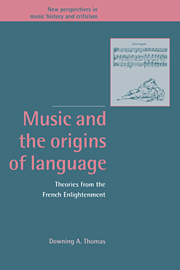Book contents
- Frontmatter
- Contents
- Acknowledgements
- Introduction
- 1 Music and language
- 2 Origins
- 3 Music theory and the genealogy of knowledge in Condillac's Essai sur l'origine des connaissances humaines
- 4 Music and original loss in Rousseau's Essai sur l'origine des langues
- 5 Sensible sounds: music and theories of the passions
- Conclusion
- Bibliography
- Index
3 - Music theory and the genealogy of knowledge in Condillac's Essai sur l'origine des connaissances humaines
Published online by Cambridge University Press: 15 December 2009
- Frontmatter
- Contents
- Acknowledgements
- Introduction
- 1 Music and language
- 2 Origins
- 3 Music theory and the genealogy of knowledge in Condillac's Essai sur l'origine des connaissances humaines
- 4 Music and original loss in Rousseau's Essai sur l'origine des langues
- 5 Sensible sounds: music and theories of the passions
- Conclusion
- Bibliography
- Index
Summary
Condillac is interested in the ways in which signs in general, and language in particular, allow us to combine thoughts and construct knowledge. The larger aim of the Essai sur l'origine des connaissances humaines, first published in Amsterdam in 1746, is to rid philosophy of the metaphysics of Aristotle, which is characterized as “a kind of magic incantation [enchantement]”, and to supplant it with a radical empiricism based on Locke's rejection of innate ideas and inspired by Newton's single principle of the conservation of movement. By analogy with the Newtonian, physical universe, Condillac claims that “the brain can be acted upon only by motion” (43n). As he would later clarify in the Traité des sensations, all the operations of the mind are based on the displacement and transformation of basic sensation: “judgment, reflection, desires, passions, and so on are only sensation differently transformed”. The growth of our ideas should be conceived of as a natural process deriving from sensation – a series of ever-expanding equivalencies branching out from our immediate experience of physical nature to the most complex operations of the mind. This new philosophy sets itself the task, then, of extracting all of human knowledge from sensations. Yet Condillac tempers this empiricism with an emphasis on language. He recognizes that signs are necessary for thought and seeks to reconstruct the genealogy of knowledge through the development of language. As Sylvain Auroux has rightly commented, Condillac's sensationalism results in a “metalinguistic empiricism”.
- Type
- Chapter
- Information
- Music and the Origins of LanguageTheories from the French Enlightenment, pp. 57 - 81Publisher: Cambridge University PressPrint publication year: 1995



